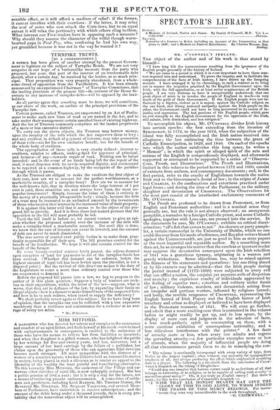TURNPIKE TRUSTS.
[BY A CORRESPONDENT.]
A NOTICE has been given of another attempt by the present Govern- ment to legislate on the subject of Turnpike Roads. We are not very sanguine in our hope of a businesslike measure from the party who proposed, last year, that part of the interest of an irredeemable debt should, after a certain day, be received by the lender, as so much prin- cipal. That proposition was very properly abandoned, from a whole- some dread of opposition from the Fundholders. It has been already announced by an experienced Chairman* of Turnpike Committees, that the leading provision of the present bill—the consent of the Home Se- cretary to any increase of turnpike-debt—will be opposed by the land- holders.
As all parties agree that something most be done, we will contribute, as our share of the work, an outline of the principal provisions of the Turnpike-law. Certain persons, called Trustees, are empowered by an Act of Parlia- ment to make such new lines of road as are named in the Act, and to take under their management certain specified lines of existing highway. And the list of Trustees commonly comprises all the landed proprietors of a more or less extensive district.
To carry out the above objects, the Trustees may borrow money, upon the security of the tolls which the Act empowers them to levy ; and any creditor, in default of piyment of interest, may take possession of these tolls—not for his own exclusive benefit, but for the benefit of the whole body of creditors.
The appropriation of these tolls is very clearly defined : interest to creditors, salaries to officers, sinking-fund for payment of principal, and balance—if any—towards repair of road. Nothing can be better intended : and in the event of no funds being left for the repair of the road, it must dispense with its newly-acquired dignity, and condescend to be repaired as a common highway, by the occupiers of the parishes through which it passes.
As the Trustees are obliged to make the creditors the first object of their care, how are we to account for the perfect worthlessness, as a marketable security, of a turnpike-bond ? How are we to account for the well-known fact, that in districts where the large interest of 5 per cent is paid, these securities are, and always have been, the most un- popular investment? Simply, because the value of them is entirely at the mercy of a practically irresponsible body : simply, because the debt of a trust may be increased to an unlimited amount by the investments of those who receive their interest in the increased value of their property.
It is against this latter evil that it seems to be the object of the pro- posed bill to provide. And it is from these last-named persons that the opposition to the bill will most probably be led. Until the bill itself is before ua, we cannot venture to give an opi- nion whether the proposed control over the increase of the debt will make a turnpike-bond a marketable security. But until this is done, we know that the rate of interest can never be lowered, and the amount of debt can never be much diminished.
The true secret of control over public bodies is to make them prac- tically responsible for all their acts. The bill promises control for the benefit of the bondholder. We hope it will also contain control for the benefit of the farmer.
By some loosely-worded statutes lately passed, the odious demand upon occupiers of land for payments in aid of the turnpike-funds has been revived. (Whether this demand can be enforced, before the highest amount of legal toll has been levied upon the traveller, is vet a disputed point.) But the revival of this direct tax makes it the duty of the Legislature to enact a more than ordinary control over those who are empowered to demand it.
Before the proposed bill passes into a law, we beg to propose to the author of it this plain question : Suppose a body of trustees are reck- less in their expenditure, within the letter of the law—suppose, what is worse, that they act in defiance of the law, by expending their funds on illegal objects—how is a farmer to make himself sure of the suspected fact; and how is he to seek redress, when taxed to supply the deficiency ?
We shall probably revert again to this subject : for we have long been of opinion, that the turnpike-tax can be collected with a less expensive machinery than a residence and maintenance for a collector at an ave- rage of every ten miles.
• Mr. M•Iiirmosr.


























 Previous page
Previous page